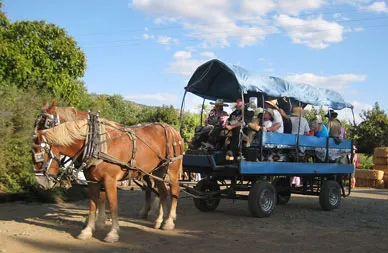
Agendas and many of the presentations from the first four workshops are available here.
There will be at least one more workshop in this series. Registration for each is now open and available online. Details:
- Rescheduled: May 18: Central Coast
UC Cooperative Extension Monterey County office, Salinas CA
Register for the Salinas workshop
View the workshop agenda
View the workshop flier
Please note that this workshop was previously scheduled for March 3, but has been rescheduled for May 18.
More about the workshops
The primary goal of the "Growing Agritourism" workshops is professional development and networking for everyone involved in local agritourism. The workshops will address challenges related to permits, regulations, planning, marketing and risk management.
The workshops will also include:
- Presentations from agritourism operators and other regional experts about the benefits, possibilities and challenges of California agritourism
- Resources and tools for marketing, agritourism association development and effective collaboration
- Facilitated discussions among local government staff members, agricultural professionals, tourism professionals and agritourism operators to share perspectives and help build regional networks
The workshops are sponsored by the UC Small Farm Program, UC Cooperative Extension and local partners, including the Sierra Nevada Conservancy and Valley Land Alliance. Funding to support the workshops is from Western Sustainable Agriculture Research and Education. View the press release.
Agritourism benefits and challenges
Agricultural tourism, or agritourism, allows travelers a chance to visit working farms and ranches and can include experiences such as visiting a pumpkin patch, tasting wine, staying at a guest ranch, enjoying a U-pick farm or attending a harvest festival.
"Agritourism supports rural economies and strengthens urban-rural connections," said Penny Leff, statewide agritourism coordinator for the UC Small Farm Program. "But the challenge is agritourism puts farmers and ranchers in a whole new business — the hospitality business — with a whole new set of skills to learn and a new network of colleagues to work with."
Findings from a 2009 survey of California agritourism operators confirmed that agritourism can indeed be a profitable venture for farmers and ranchers. But when it came to the topic of permits and regulations, nearly 70 percent of the comments mentioned slow, complicated processes or high fees and regulatory restrictions as major barriers to new operations.
For questions or more information, please contact Penny Leff at paleff@ucdavis.edu or (530) 752-7779.
